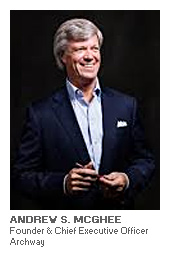
In a middle market lending environment marked by tightening bank credit and growing investor appetite for private credit, industry veteran Andy McGhee is making a bold move. Backed by a $500 million capital commitment from BharCap Partners and Delaware Life Insurance Company, McGhee has launched Archway, a new specialty finance platform focused on serving the underbanked $10–$50 million loan segment.
With a leadership team that previously built the highly respected AloStar platform, Archway is entering the private credit market not to chase billion-dollar deals, but to fill a critical and often overlooked gap in the true middle market. Nimble, experienced, and unburdened by the constraints of traditional capital structures, Archway aims to be more than just another lender in a crowded space; it intends to be a trusted, long-term partner to borrowers facing both growth opportunities and transitional challenges.
McGhee, Archway’s Founder and CEO, met with Michael Toglia, Publisher of ABL Advisor to discuss this new and exciting new entrant into the middle market lending landscape.
Michael Toglia: Congratulations on your newly launched company Andy! You’ve launched Archway with a $500 million capital commitment in a crowded private credit market. Why is now the best time to launch Archway and what gaps or needs in the middle market are you aiming to address that you believe others cannot?

Andy McGhee: There’s plenty of money chasing deals in private credit, but the $10 to $50 million true middle market is underserved. Larger asset managers raise billions and must focus on bigger transactions. We see real opportunity to add value in this range.
From our AloStar experience, we know this gap exists and we can serve it well. Today’s environment is uncertain, and some lenders pull back at the first sign of client trouble. Our team can step in, refinance, and provide needed liquidity. This is the right time to re-enter this segment. Competing at $100 million and above would be tough, but in our space we can truly stand out.
Toglia: Is it safe to say a group like yours allows you to be nimbler than some players in the marketplace from your perspective?
McGhee: I think nimble is a pretty good word. We can react very quickly to an opportunity. We can't spend a lot of time kicking a deal around trying to decide if we want to do it or not. We have to review it and decide whether we want to do it. If we do, we pursue it fully. If we don't, we tell the person why we can't do it. We're very honest and open with borrowers regarding what the issues are on transactions.
Our goal is not to be a “me too” lender. Thanks to our partners, we can look deeper into the asset stack and offer more flexibility than most lenders.
Toglia: Archway offers loans from $10 million to $50 million, with the potential for larger commitments. Can you walk us through your ideal borrower profile, and how your approach differs for a growth capital deal versus a turnaround situation?
McGhee: We can provide the full spectrum of senior capital for companies that have steady cash flow and others that may have had a blip in their earnings. We can help by leveraging all of the assets including accounts receivable, inventory, machinery and equipment, owner occupied real estate, IP and whatever else they may have on their balance sheet. We will find a way to drive maximum liquidity for borrowers with one facility and when needed we may even do a stretch piece.
We can provide additional liquidity because we use all the assets on the balance sheet. We’re not restricted by a traditional bank’s credit line which limits a competitor’s ability to advance against some of their clients’ longer-term assets. If you think about a middle-market company, their finance staff is typically a bit understaffed, and those people are under a lot of stress. So, would you rather deal with Archway as a one-stop shop or would you rather deal with a working capital lender, a machinery and equipment lender, and a real estate lender? I think the obvious answer is you'd want to deal with Archway and deal with a one-stop shop.
Our partners at BharCap and Delaware understand and support this model, in part because of our proven track record at AloStar.
Toglia: With the growth of private credit and a rising number of non-bank lenders in the market, how does Archway plan to differentiate itself in terms of deal sourcing and client retention?
McGhee: We source deals through long-time contacts—accountants, attorneys, bankers, consultants, family offices, and private equity firms—and by rekindling relationships with people who know our track record. What sets us apart is not sourcing, but how we act during and after a deal.
Every borrower may face challenges. If that happens, we don’t rush to seize collateral or pile on fees. We sit down, assess the impact, and work through solutions if there’s a sound plan. That reputation for steady partnership is something we built years ago and now bring to Archway.
Toglia: Will Archway be looking for partners and participants on larger deals via syndication?
McGhee: Yes, we do look at such deals as an opportunity to syndicate. We're actually already in the market talking with some people about potentially buying deals. We recognize this is a two-way street If we need to go above our target transaction size, we have a partner with a balance sheet that can help underwrite larger deals
Toglia: How does your capital base (including backing from BharCap and Delaware Life) influence your flexibility or ability to take on more bespoke, non-traditional structures in middle-market lending?
McGhee: Well, the first thing I would say is they both have experience in specialty finance, so this is not their first step into the specialty finance world. They know what to expect. We spent hours and hours on calls talking almost philosophically about how we want position Archway, what we want to do, what we want to be both in the short and long term, and how that ultimately drives value for their investment; and they believe in it. As a result, the capital they provide gives us, in my opinion, maximum flexibility as a firm to provide capital to our end client. It’s incredibly important that we have a partner that understands this. Other investors pushed us toward a bank-line model, which would have made us just another lender. BharCap and Delaware embraced our strategy, and that sealed the partnership.
Toglia: Is Archway sector agnostic?
McGhee: I view us as industry agnostic. We want to evaluate opportunities across sectors and choose the best deals rather than force concentration. On the ABL side, we’re most active in manufacturing and distribution, while on the finance side we monitor about 15 sectors.
Markets shift, so we adjust. In the past we reduced exposure when risk-return deteriorated, then expanded again when conditions improved. That flexibility keeps our portfolio strong.
Toglia: The founding team has deep roots in asset-based lending and specialty finance. How does that collective experience influence your underwriting philosophy and risk appetite, particularly in today's economic climate?
McGhee: I couldn't be happier. They're veterans of the business. They know it inside and out. They've been through the wars, they've seen the good economic times, they've seen the really, really difficult economic times. And I know from working with each one of them that they're not going to panic if there's an issue which is very important to me.
We have Neil Mulford who is running portfolio and underwriting, David Phillips who ran all of originations for me at AloStar has joined us on the business development side, Mark Kassis, who possesses years and years of experience in credit and in all different kinds of asset classes. We also have Janet Riccard as our head of operations. Janet worked for us at AloStar as well and is a veteran of this business. In my opinion, having a very good and stable back office is incredibly important. I always tell people that's your first line of defense. I feel great about the team that we have assembled, and we will continue to add to it. We have a few positions we would like to add now including an underwriter and one more BDO. If we can fill those positions, I think we will be set for the next 12 months or so.
Toglia: How would you describe the current lending environment in the middle market today?
McGhee: Uncertain is the best way to describe it. Banks have been pulling back significantly and then we see them jump back into the market because they need assets. This is driving more liquidity into the market. You also see other non-bank lenders that have raised a lot more money or partnered with a different firm all of a sudden saying, "My minimum is no longer $10 to $15 million or even $20 million. It’s $50 million and above."
Toglia: Looking ahead, what are your near-term growth priorities for Archway, and what does success look like for the firm over the next 12 to 24 months in terms of market share, product expansion, or geographic reach?
McGhee: If Archway can be viewed in the market as a reliable partner in 12 to 24 months and can do eight to 10 deals in the first year and in the next 12 months do another eight to 10 deals, I'll think that's a huge success. More so than the financials, which we'll follow, we need to build the reputation of being that partner that you want to rely on. Our plan is to provide a quick and honest response, and when we tell you we're going to do something, we execute on that. If we can do that in 12 months, we're in great shape. I'll be very, very happy.
Toglia: Is there anything I should have asked today you want to talk about Andy?
McGhee: The only thing I would add is that it’s very important to have good partners and to attract good employees. I think we've done both. Once you do that and you know what your mission is, you have your values all stacked up and everybody's going in the same direction, deal flow should follow. And that's where I think we are. We have good partners, good capital structure, a great initial team, and we're looking to deploying the capital.